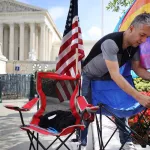Seven years after being denied access to his high school bathroom, Gavin Grimm’s legal saga ended Monday when the Supreme Court declined to hear the Virginia school board’s challenge against allowing transgender students to use bathrooms that match their gender identity.
The decision to not take up Gloucester County School Board v. Grimm means that lower court rulings in the now-22-year-old’s favor will remain intact. Those decisions — which found that the school board in 2014 violated the 14th Amendment’s Equal Protection Clause plus sex-based discrimination law Title IX — are now underscored at the federal level by the Biden administration’s move to extend Title IX protections to gay and trans students.
“I am glad that my years-long fight to have my school see me for who I am is over,” Grimm said Monday, through a statement shared by the ACLU. “Being forced to use the nurse’s room, a private bathroom, and the girl’s room was humiliating for me, and having to go to out-of-the-way bathrooms severely interfered with my education,” he said.
Amit Paley, CEO of the Trevor Project, said in a statement that the advocacy group’s research from last year found that trans and nonbinary youth who were discriminated against based on which bathroom they used “had more than 1.5 times the odds of reporting a suicide attempt in the past year.”
The court’s decision on Monday is “a huge win for transgender students,” tweeted Shannon Minter, legal director of the National Center for Lesbian Right, which led arguments to challenge California’s gay marriage ban from 2004 to 2008.
One case backed by Lambda Legal, in which a Florida student was told he could only use gender neutral bathrooms at his Ponte Vedra, Florida high school, could be affected by Monday’s decision, according to Joshua Block, the ACLU’s senior staff attorney. The 11th Circuit is considering a hearing with the full court to review the existing victory by the appeals court, Block told The 19th.
The court’s decision follows an ACLU lawsuit filed last Friday to challenge Tennessee’s first-of-its-kind law requiring businesses and government buildings to warn patrons that transgender people may use public restrooms. More lawsuits backed by the ACLU and Human Rights Campaign are underway, challenging bills in other states, including West Virginia, Arkansas, and Florida, that target transgender youths.
Paul Castillo, the counsel and students’ rights strategist at Lambda Legal, told the 19th that the move was a signal to statehouses. “State legislatures who are still considering laws which exclude LGBTQ people should reconsider, given the uniformity in courts that have said, ‘discrimination based on sexual orientation and gender identity is sex discrimination prohibited by federal law,’ he said.
Castillo added that it would be “inconceivable” that a court wouldn’t consider Monday’s Supreme Court decision when weighing similar cases.






